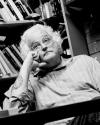Class Description:
This class explores key legal, ethical, cultural, scientific, and commercial aspects of the rapidly changing world of biotechnology and bioinformatics. It specifically asks how new discoveries in biology encourage us to rethink issues of ownership, communication, geography, identity, and artistic practice. Come find out about the often exhilarating and frequently frightening scenarios for the future of your body.
Students will be specifically encouraged to ask the following questions:
What are the ethical and legal issues involved in patenting human cell lines?
How are recent biotechnologies portrayed in science fiction films? What can we learn by studying these portrayals?
What does it mean to suggest that biotechnology is part of "an information society"?
How are race, class, gender, and disability mapped onto or intersect with biomedicine?
How are artists using live organisms in their art work? What can we learn about art, ethics, and scientific practice by studying this work?
This class is designed to appeal to all. No prerequisites needed!
Learning Objectives:
· Students will acquaint themselves with important emergent issues surrounding biomedicine and the dominant ways that these issues have been studied, including biopolitical, political economic, science and technology studies, disabilities studies, philosophic, cultural, literary, and media studies analyses.
· Students will gain familiarity with common procedures used in the biomedical sciences.
· Science students will gain confidence in applying humanistic research themes to scientific topics while humanities students will gain confidence reading and analyzing scientific texts and concepts.
· Students will gain practice researching and composing original research papers.
· Students will improve their communication skills through their participation in discussions held in the lecture hall and discussion sections.
· Students will improve their reading skills by completing reading assignments and writing upon what they thought were the major themes of these assignments during class.
· Students will gain a sense of how different ways of explaining the world (science and the humanities, for instance) can complement each other.
